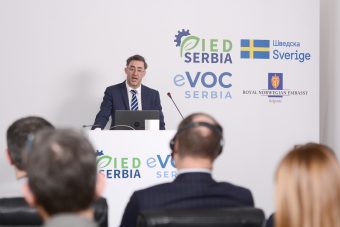
Serbia is engaged in intensive preparation of its negotiating position for Chapter 27, dedicated to environment and climate. In the process of EU accession, one of the key points for our institutions is the Industrial Emissions Directive. To meet European standards in this field, we have received support from the Norwegian government to adopt and implement of legislation pertaining to volatile organic compounds (VOC), which is a constituent part of Chapter V of the aforementioned Directive. The eVOC Serbia Project is implemented by the Cleaner Production Centre of the Faculty of Technology and Metallurgy in Belgrade. Volatile organic compounds are used in numerous production processes, says Geir Johansen, Deputy Head of Mission at the Royal Norwegian Embassy in Belgrade. “We usually come into contact with these compounds when we use everyday products such as paints, furniture, packaging or dry-cleaned clothes.
”However, exposure to these materials is not significant, as their use is strictly regulated. Despite the fact that harmonization of the Serbian legislation with the EU legislation is still relatively low when it comes to VOC, VOC’s impact on air pollution is limited compared to other pollution sources. Still, these organic compounds may be hazardous for human and animal health, which is why it’s important to have a database of VOC operators that will include not only large companies but also small and medium enterprises that use these chemicals, without even being aware of it. Thanks to the eVOC Project, a digital database of VOC operators will be established for the first time in Serbia, notes Geir Johansen.
The Department for air protection and the ozone layer of the Ministry of Environmental Protection and the Environmental Protection Agency are the competent authorities for implementing legislation in this field. The eVOC Serbia Project provides support to these authorities for the complete transposition of Chapter V of the Industrial Emissions Directive through updates and additions to the national legislation, identification of companies currently operating in Serbia, which are under the scope of the VOC legislation and by preparing the future electronic Register of VOC operators. Special attention has been paid to this tool, which will form a constituent part of the National Register of Pollution Sources. Through the Register, VOC operators will submit data and documents required by the Regulation in digital form. Another group of important stakeholders in this process are the local inspectors, as they play a key role in the implementation of the VOC Regulation. The Project includes the organization of specific training to increase the knowledge on volatile organic compounds emissions, industrial sectors that fall under the Regulation’s scope and the techniques to decrease VOC use and emissions.
In focus:
First and foremost, the inspectors will be trained to assess compliance with the Regulation requirements, specifically in terms of emission limit values for air emissions and the control of the annual solvent management plan. Local inspectors will have nine general and sector-specific training that will also include VOC operators. Within this training, they will visit four companies to perform on-site inspections. Chapter V of the Industrial Emissions Directive encompasses 20 industrial sectors, from printing to dry cleaning and coating. An annual threshold for solvent consumption has been prescribed for each sector. An operator falls under the Directive’s scope solely if their annual solvent consumption exceeds the threshold for their sector.
These thresholds, as well as all other provisions, have been transposed into the national legislation by the Regulation on the list of industrial installations and activities for which volatile organic compounds emissions are controlled, on the values of volatile organic compounds emissions at a certain solvent consumption and total emission limit values, as well as an emissions reduction scheme (“Official Gazette of the RS” no. 100/2011), which must be updated to completely transpose the aforementioned Chapter. Communication between the expert and general public is very important, so an Info Centre will be formed, to serve as a place to present informative materials, knowledge on volatile organic compounds, and on the legislation in this field. The eVOC Project will contribute to economic growth, competitiveness and capacity building in the field of environment protection, climate and energy, and it will be completed in December 2022.
Prepared by: Milica Radičević
Read the whole interview in the new issue of the Energy portal Magazine CIRCULAR ECONOMY, march 2021 – may 2021.


